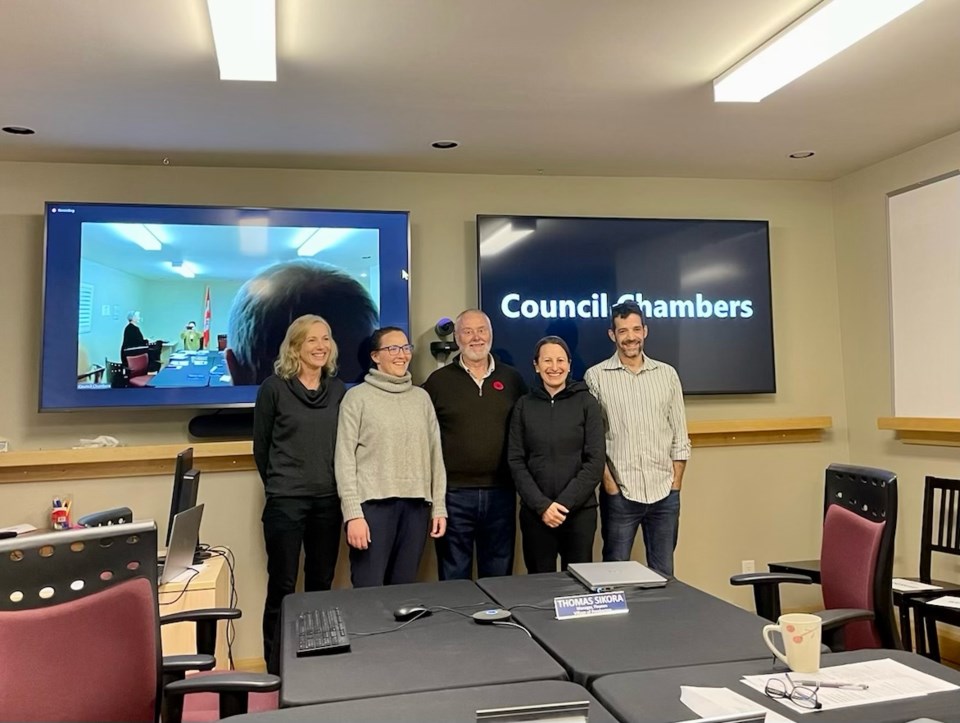The Village of Pemberton met with representatives from West Coast Environmental Law (WCEL) this week, hearing a pitch about the campaign “Sue Big Oil.”
WCEL was invited to speak to council on Oct. 22 after Councillor Katrina Nightingale brought the idea to council in early October. While no decision was made, the VOP listened to and asked questions of WCEL representatives Fiona Koza and Andrew Gage, who joined in person and via Zoom, respectively.
Koza, who joined in-person, explained that from flooding and landslides to wildfires, heat waves and droughts, Pemberton and other municipalities face mounting costs from climate change damage and adaptation measures.
“It's particularly hard, I think, for small communities that have a small tax base to pay for such climate costs,” she said.
She pointed out if everyone is responsible for climate change, from individuals to corporations, individual taxpayers shouldn’t have to bear the brunt of costs associated with damage and adaptation.
“The industry that is most responsible for causing climate change is not paying for anything for climate damage and climate adaptation, and this is bad economics,” she said.
Class action litigation process
WCEL is a non-profit advocacy group pushing the campaign, but would not be the litigators. They need enough municipalities to represent half a million residents before a case could move forward and one or more municipalities would have to step up as the lead plaintiff(s). They also need a second large municipality to sign on, as Burnaby’s agreement is conditional on another big player coming to the table.
One argument Gage and Koza made to encourage the VOP’s signature is that federal disaster relief will increasingly be spread far and wide, leaving some out in the cold. WCEL referenced Merritt, Princeton and Abbotsford’s rejection by the feds for disaster relief from devastation caused during the 2021 atmospheric rivers.
They pointed to cities in the U.S. which had sued oil companies, and made nods to cases against tobacco, asbestos and pharmaceutical companies.
While most questions centred around the logistics of a class action lawsuit, Coun. Ted Craddock’s comments related to the graphs shown by WCEL, which gave global emissions statistics that were about 10 years old.
“I’m just looking at Canadian sets. I don’t care about the U.S.,” he said.
Gage said global fossil fuel emissions are salient because they also cause harm in Canada.
“It’s also 10 years old. How do I put my faith in a 10-year-old graph?” Craddock replied.
Gage replied by saying the figures aren’t very different from 10 years ago compared to today, and that he would find an updated version for the VOP.
Coun. Laura Ramsden asked how the case would proceed after enough member municipalities signed on.
Gage explained the lead plaintiff would be responsible for retaining a legal team and making decisions, and after that, the first step would be having the case certified by a judge as having merit for a class action suit before moving forward.
A judge would have to confirm international fossil fuel companies could be sued in B.C.’s courts and identify common issues of municipalities that could be resolved through the suit, along with what share of the cost the companies are responsible for and what legal category the case fits in.
“At the end of that, the judge will make a ruling on those issues. At that stage, it's highly likely that the class action will be settled, because the question of the liability of the companies will have been determined. It's just a question of how much that they're liable for,” Gage said.
If the companies didn’t settle “there would have to be a further stage of litigation where each municipality would show what they are entitled to based on the costs that they have suffered as a community,” Gage added.
No firm commitment yet
One benefit of pursuing a class action lawsuit in B.C. specifically comes from the legal system in the province.
“B.C.’s class action laws are such that, if there's a class action brought forward and you lose the case, you do not have to pay the other side’s legal fees, and that's just for class actions in B.C., and it's unique among all the Canadian provinces,” Koza said.
Nightingale wondered why Vancouver hasn’t signed on, and the team explained Vancouver’s council initially voted in favour of the campaign in 2022, but the new council with Mayor Ken Sim at the helm rejected it in an 8-3 vote.
She also inquired whether the VOP would have to commit $1 per resident given their financial constraints, and Gage answered that while they could be somewhat flexible, a level of commitment is required.
“I think that we're more interested in seeing that there's a solid and firm commitment to provide support than the specific logistics of how you structure that,” he said.
If a class action moved forward, it would likely take a decade before courts decide, which WCEL reps likened to the time it takes for municipalities to plan for long-term infrastructure projects.
When all was said and done, the VOP thanked WCEL for their time and moved on to other business.




